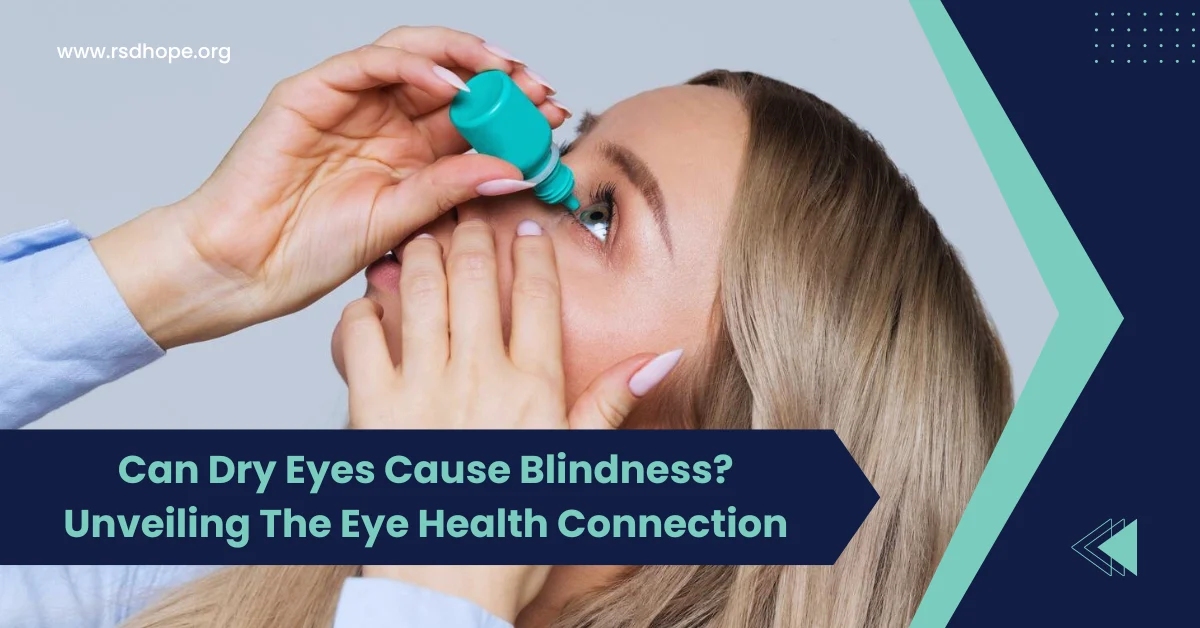Dry eyes are a common condition that affects millions of people worldwide, causing discomfort and impacting their daily lives. While many individuals may dismiss dry eyes as a minor inconvenience, it’s crucial to understand the potential consequences of leaving this condition untreated. In this blog post, we’ll explore the link between dry eyes and vision problems, and whether dry eyes can lead to blindness.
Key Takeaways
- Dry eyes occur when the eyes do not produce enough tears or when the tears evaporate too quickly.
- While dry eyes alone do not typically cause blindness, they can contribute to other vision issues if left untreated.
- Lifestyle changes, artificial tears, and professional treatment can help manage and alleviate dry eye symptoms.
What Is Dry Eye?
Dry eye syndrome is a condition that occurs when the eyes do not produce enough tears, or when the tears evaporate too quickly. Tears play a vital role in keeping the eyes lubricated, nourished, and protected from irritants. When the eyes lack sufficient tears, it can lead to a range of uncomfortable symptoms, such as:
- Stinging or burning sensations
- Redness and irritation
- Gritty or sandy feeling in the eyes
- Blurred vision
- Light sensitivity
Dry eyes are a prevalent condition, affecting people of all ages, but are more common in older adults and women.
Also Read: What Is Commonly Misdiagnosed As Pink Eye? Identifying The Imposters
Dry Eye Causes
Several factors can contribute to the development of dry eyes, including:
- Environmental factors: Dry air, wind, pollution, and air conditioning can cause tears to evaporate more quickly.
- Lifestyle factors: Excessive screen time, contact lens use, and certain medications can lead to dry eyes.
- Medical conditions: Autoimmune disorders like Sjögren’s syndrome, hormonal changes, and aging can affect tear production.
Understanding the underlying causes of dry eyes is essential for developing an effective treatment plan.
Can Dry Eyes Cause Blindness?
While dry eyes can be uncomfortable and impact vision, they do not typically cause blindness on their own. However, if left untreated, severe dry eye syndrome can lead to complications that may threaten eye health, such as:
- Corneal damage: Chronic dryness can cause the cornea, the clear outer layer of the eye, to become scratched or ulcerated.
- Increased risk of eye infections: Tears help protect the eyes from bacteria and other irritants. When tear production is reduced, the risk of eye infections increases.
Although these complications are rare, they highlight the importance of addressing dry eye symptoms and seeking proper treatment.
Can Dry Eye Cause Other Vision Issues?
In addition to the potential complications mentioned above, dry eyes can contribute to other vision problems, including:
- Blurred vision: When the eyes lack sufficient lubrication, it can cause temporary blurred vision.
- Light sensitivity: Dry eyes can make the eyes more sensitive to light, causing discomfort and difficulty seeing in bright environments.
- Difficulty driving at night: Dry eyes can cause glare and halos around lights, making night driving challenging.
- Exacerbation of existing eye conditions: Dry eyes can worsen symptoms of other eye conditions, such as astigmatism or myopia.
How to Cure Dry Eyes Permanently?
While there is no one-size-fits-all cure for dry eyes, several strategies can help manage and alleviate symptoms:
- Lifestyle changes: Use a humidifier, take regular breaks from screens, and practice good eye hygiene.
- Artificial tears and lubricating eye drops: Over-the-counter products can help lubricate the eyes and provide temporary relief.
- Professional treatment: An eye care specialist can develop a personalized treatment plan, which may include prescription medications, special contact lenses, or in-office procedures.
- Long-term management: Regular eye exams and ongoing care are essential for maintaining eye health and preventing complications.
Read More: How To Cure Double Vision Naturally? Restore Clear Vision!
Conclusion
While dry eyes can be a frustrating and uncomfortable condition, they do not typically cause blindness on their own. However, untreated dry eyes can contribute to other vision problems and potentially lead to more serious complications.
By understanding the causes and symptoms of dry eyes, and taking proactive steps to manage the condition, individuals can maintain optimal eye health and quality of life. If you experience persistent or severe dry eye symptoms, don’t hesitate to consult with an eye care professional for personalized guidance and treatment.
FAQs
A: While there is no permanent cure for dry eyes, the condition can be effectively managed with proper treatment.
A: Dry eyes can affect people of all ages, but they are more common in older adults and women.
A: Yes, a diet rich in omega-3 fatty acids, found in fish and flaxseed, may help alleviate dry eye symptoms.
A: The frequency of use depends on the severity of your symptoms. Follow the instructions on the product or consult with your eye care professional.
Sources:
- National Eye Institute: https://www.nei.nih.gov/learn-about-eye-health/eye-conditions-and-diseases/dry-eye
- American Optometric Association: https://www.aoa.org/healthy-eyes/eye-and-vision-conditions/dry-eye

